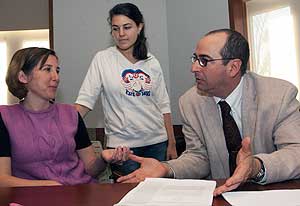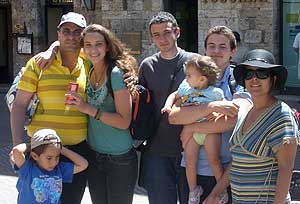Itai Sened, a scholar of the origins of property rights and the workings of multiparty legislative systems, has spent his career pursuing a new understanding of the role cultural, social and political institutions play in shaping human behavior.

As director of the Center for New Institutional Social Sciences (CNISS) at Washington University, Sened is charged with carrying on the legacy of Douglass C. North, Ph.D., the Spencer T. Olin Professor in Arts & Sciences and co-recipient of the 1993 Nobel Memorial Prize in Economic Sciences.
“It’s no longer that new, but it is a different approach for understanding the social sciences, one that emphasizes the role of institutions in shaping your social and personal life,” says Sened, Ph.D., professor of political science in Arts & Sciences and faculty member at WUSTL since 1996.
North won the Nobel in part for his work on the role that institutions play in shaping the economic well being of nations — what makes some countries rich and others poor. It was research along these lines by North and his colleagues at WUSTL that first attracted Sened to WUSTL following his doctoral degree in political science from the University of Rochester in 1990.
“I was incredibly lucky at Rochester because I ended up being the last student of William H. Riker, who was, by anyone’s account, one of the top five political scientists of the 20th century,” Sened says. “I got my Ph.D. out of Rochester, and then Riker literally handed me over to Doug North. I did my postdoc here because of North’s interest in institutions.”
Intro to U.S. academia
While mentors such as Riker and North may be responsible for Sened’s interest in institutions, his obsession with social issues can be traced to his own family’s personal experiences with violence and injustice.
His father, Alexander Sened, fled Poland in 1935 as anti-Jewish sentiment mounted, settling in what would later become Israel. He returned to Europe after the war to organize the immigration of Jewish refugees and, in the process, met his future wife, Yonat. She and her parents miraculously had escaped Poland’s infamous Nazi-controlled Warsaw Ghetto.
When Israel’s war of independence broke out, the couple went to Israel illegally, settling in the remote, hilly desert community of Kibbutz Revivim, an area largely populated by nomadic Arab Bedouins. Poor and self-educated, his father joined the Labor youth movement. He later became head of the youth movement and then the editor of Israel’s leading publishing house, Hakibbutz Hameuchad. His mother went on to lecture in Hebrew literature at Ben-Gurion University.
Together, Alexander and Yonat Sened authored more than 10 novels, many dealing with the experiences of Holocaust survivors and other Jewish refugees struggling to make a new life in Israel.
“My parents were relatively well-known writers, and they wrote together as a couple, which is somewhat unusual, so they both got invited to spend a year at the University of Iowa writers program,” Sened says.
“I was 15 going on 16 at the time, so I got a pretty wonderful exposure to American academia,” he says. “Coming from the desert and this background of terrible social injustice, Iowa City, Iowa, was an amazing environment for me; it seemed like a light at the end of a tunnel.”
Wanting justice done
Sened envisioned a career in academia, but getting there would be a challenge.
“I never had any doubts, but the problem was that I was born in a kibbutz, so I didn’t have any money,” he says. “I was literally penniless when I finished my military service at age 21.”
Sened eventually settled in Paris, where he took a job as a delivery boy for a company selling luxury goods to tourists. Over the next five years, he worked his way up to head of the company, all the while stashing money for an eventual return to school to earn an undergraduate degree in philosophy and political science at Tel Aviv University.

While in Paris, he became closely acquainted with Bernard Henri-Levy, a French intellectual, philosopher and journalist who became the driving force behind a rising group of young intellectuals now known as the New Philosophers.
“Because of my upbringing and because of my interest in social justice, I was actually more inclined to pursue a career in philosophy,” Sened says. “I eventually found philosophy to be too academic and arcane. I wanted justice to be seen and done. It was not enough to simply discuss it.”
This drive to get involved in something tangible led Sened to leave WUSTL while doing postdoctoral research and return to Israel in 1991 to work in the re-election campaign of Prime Minister Yitzhak Rabin.
After Rabin’s election, he continued to work as a strategic consultant to the administration during the era of the Oslo agreement, including planning for the so-called security wall separating Israeli- and Palestinian-held territories in the West Bank.
In parallel, Sened was pursuing his academic career at Tel Aviv University.
“After the assassination of Rabin on Nov. 4, 1995, my friends at Washington University invited me to come back here,” Sened says. “I was working full-time here in January 1996, so the whole transition took little more than five or six weeks.”
He has called St. Louis home ever since. His wife, Sarit Smila, Ph.D., recently earned a doctorate in philosophy at Washington University and teaches both at WUSTL and at nearby Webster University. He is the father of five children.
‘We mark them for life’
Sened continues to credit much of his academic success to the incredible opportunities he has had to work closely with world-class mentors.
As CNISS director, he makes it his mission to seek similar opportunities for his students, often arranging for them to work side-by-side with the very best faculty in their respective fields.
|
Itai Sened |
|
Born: Kibbutz Revivim, Negev, Israel Degrees in: B.A., political science and philosophy, 1985, Tel Aviv University, Tel Aviv, Israel; M.A., Ph.D., political science, 1986-1990, University of Rochester Dissertation: “A Political Theory of Rights” Hobbies: Swimming, windsurfing and family vacations to Italy, Latin America and islands of the Caribbean |
Under Sened’s direction, CNISS has launched several “natural sciences-type” learning laboratories, which bring together faculty and students from across campus for cross-disciplinary research challenges. Teams typically consist of five or six senior faculty, four or five doctoral students and several undergraduates.
One project exploring the economic impact of the middle class involves several faculty and students from the George Warren Brown School of Social Work along with others from political science and economics in Arts & Sciences. Another examining non-price barriers to the development of alternative energy technologies draws faculty from political science, economics and earth and planetary sciences in Arts & Sciences and from the Department of Energy, Environmental & Chemical Engineering in the School of Engineering & Applied Science.
“What warms my heart, what makes my day,” Sened says, “is sitting in a meeting on the renewable energy project and seeing our students, including two undergraduates from China, discussing these issues with first-class scholars in the field. To me, that’s the height of what we’re supposed to do and what is so wonderful in what we do.”
This year, two CNISS undergraduates, Charis Fischer and Adrian Torres, were two of only four students in political science to graduate with the highest honors, and both were recognized with special awards for their research.
“Our students tell us repeatedly that this is a life-changing experience for them,” Sened says. “Probably the most important thing we do is give them firsthand experience with what it takes to do cutting-edge research in the social sciences.”
While Sened is known for being a tireless, prolific researcher, his work with students is his passion, says Gary Miller, Ph.D., professor of political science.
“Itai has a nurturing, very paternal relationship with his students,” Miller says. “Not just during their years here but also for their entire careers. He brings his students back to campus for visits, and it’s clearly a joy for him to see them.”
Sened just returned from Bloomington, Ind., where he spent Thanksgiving with a former student completing a doctorate under Elinor Ostrom, Ph.D., the most recent recipient of the Nobel Memorial Prize in Economic Sciences.
“What they end up doing, which is fantastic, is carrying on the mission that got handed over to us from William H. Riker and Douglass C. North,” Sened says.
“They’re all interested in the way that institutions affect social outcomes, economic prosperity and social and political stability and welfare, and, in one way or another, they’ll all be involved in this for the rest of their lives,” he says. “So, in this respect, we mark them for life.”